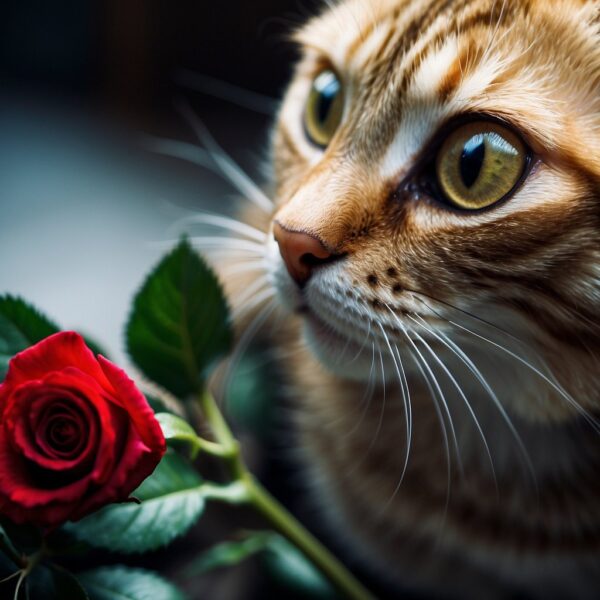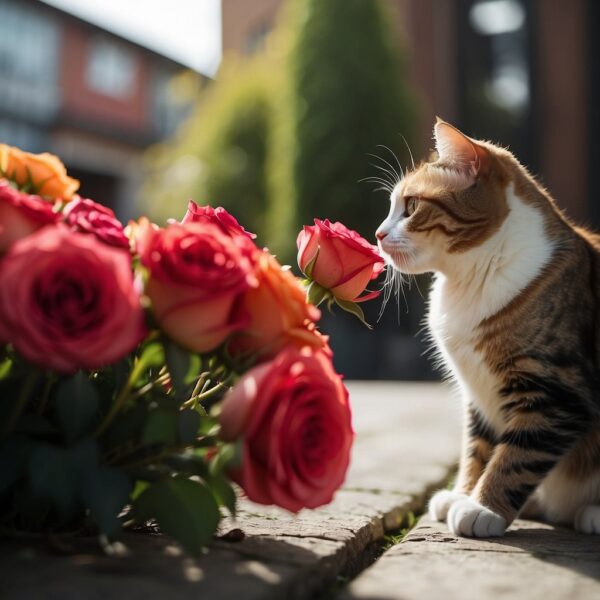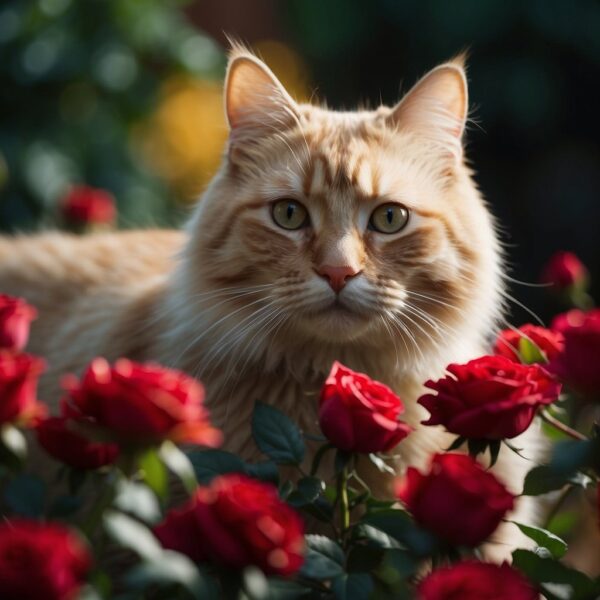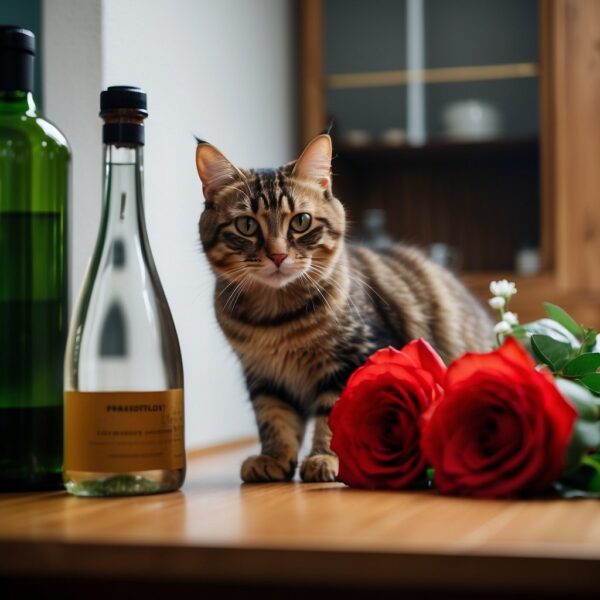
Roses are not poisonous To Cats
Are roses poisonous to cats? Many cat parents are concerned about the potential hazards that common household plants may pose to their cats. Amongst these, roses frequently come under scrutiny. Roses are not toxic to cats, and this includes all natural species of roses as well as the cultivated varieties. While cats may show a passing interest in floral arrangements, roses themselves, as members of the genus Rosa, do not present a toxicity risk to felines.
However, while the rose petals and leaves are not poisonous, the thorns on rose stems can potentially cause injury to cats. These injuries may range from mild to severe, depending on the extent of the contact. It’s also important to note that if a cat ingests a large amount of rose leaves or petals, it could potentially lead to gastrointestinal upset. As for any non-toxic plant, moderation is key, and it’s best to prevent your cat from making a habit of eating plant material to avoid any potential upset.
Key Takeaways
- Roses are not toxic to cats but their thorns can cause injury.
- Ingesting large amounts of roses may cause gastrointestinal upset in cats.
- It’s best to prevent cats from eating roses to avoid health issues.
cats and roses: Overview of Potential Risks
When considering the safety of plants for feline companions, it’s crucial to be aware that while not all plants are toxic to cats, certain species can pose significant health risks. Knowledge of plant toxicity is essential for cat parents to ensure the well-being of their cats.
Identifying Toxic Plants
Many plants commonly found in gardens and homes could be dangerous to cats. Flowers such as lilies (Lilium spp.), moss rose (Portulaca), rosebay (Rhododendron), and rose of Sharon (Hibiscus syriacus) are poisonous to cats and can cause severe kidney damage or other toxic reactions. It’s imperative to identify and remove these harmful species from accessible areas. The following table provides an overview of some common plants and their level of toxicity:
| Plant | Toxicity to Cats |
|---|---|
| Lilies (Lilium spp.) | High |
| Moss Rose (Portulaca) | Moderate |
| Rosebay (Rhododendron) | High |
| Rose of Sharon (Hibiscus syriacus) | Moderate |
| Daffodils (Narcissus spp.) | High |
| Tulips (Tulipa spp.) | Moderate |
Cat parents should be vigilant, as even non-lethal plants can cause gastrointestinal distress if ingested.
Roses are not poisonous to Cats but their are risks
Roses (Rosa spp.) themselves are not toxic to cats. However, they can still cause discomfort if ingested due to their thorny stems and the possibility of pesticide residue, leading to symptoms like upset stomach, vomiting, or diarrhea. It’s also important to note that some related plants with “rose” in their common name, such as desert rose (Adenium obesum), Christmas rose (Helleborus spp.), and Easter rose, are indeed toxic and should be kept out of reach. When considering houseplants, options like sunflowers, snapdragons, daisies, and petunias are generally safe for cats, while azaleas, rhododendrons, and other toxic species listed above should be avoided or closely monitored.

The Role of rose Thorns in Cat Safety
While roses are not poisonous to cats, their thorns present risks for physical harm and potential complications. It’s important to understand these threats to ensure the safety and well-being of feline companions.
Physical Injuries from Thorns
When a cat’s curiosity leads it to a rose bush, encounters with thorns can result in physical injuries. These can range from superficial scratches to more severe puncture wounds in the skin or, particularly, the mouth if a cat tries to bite at the roses. Such injuries may be evident from visible wounds, excessive drooling, or a cat pawing at its mouth.
- Common physical injuries include:
- Scratches on paws or face
- Puncture wounds inside the mouth
- Thorn pricks on the skin
Infections and Complications
After a thorn has pricked a cat, there’s a risk of secondary infection if the wound is not properly cleaned and monitored. Bacteria from the thorn itself or the cat’s environment can enter the wound site, potentially leading to an abscess or more systemic signs of infection such as fever or lethargy.
- Potential complications include:
- Infection at the wound site
- Abscess formation
- Fever or lethargy indicating a more serious infection
Immediate and appropriate veterinary care is crucial when a cat exhibits signs of an infection or if a wound is deep or not healing properly.

Roses and Cats: Symptoms of Toxicity in Cats
Roses are not poisonous to cats but there are still risks. When a cat has ingested a toxic substance, certain symptoms may become evident. Cat parents should be aware of these signs to ensure timely and appropriate veterinary care.
Gastrointestinal Symptoms
- Vomiting: Cats may expel the contents of their stomach as an immediate reaction to poisoning.
- Diarrhea: A common symptom of gastrointestinal upset, diarrhea indicates distress in the digestive system.
Neurological Issues
- Seizures: In severe cases of poisoning, a cat might experience seizures, which could indicate neurological damage.
- Tremors: Less violent than seizures, tremors can be a sign of poisoning, manifesting as involuntary muscle twitches.
- Lethargy: A poisoned cat may show a marked decrease in energy levels, possibly indicating systemic effects of a toxin.
Dermatologic Reactions
- Excessive Drooling: Also known as hypersalivation, this can occur as a response to irritation or distress within the mouth or gastrointestinal tract.
- While not a dermatological symptom but related to potential poisoning discomfort, excessive drooling can accompany both gastrointestinal upset and signs of oral irritation.
Non-Toxic Alternatives and Safety Measures
When introducing plants into a home or garden where cats are present, it is crucial to choose non-toxic species and employ safety measures to protect pets from potentially harmful substances.
Safe Plants for Cats
Certain plants can be safely enjoyed by cats without the risk of toxicity if ingested. These include:
- Asters: Vibrant flowers that add color without posing a risk to felines.
- Snapdragons: Tall, attractive plants that are safe for cats.
- Sunflowers: With their large blooms, they are a safe choice that can brighten any space.
- Gerbera Daisies: Known for their bright and cheerful flowers, safe for cats to be around.
- Wax Flowers: Delicate and safe for cats to interact with.
Cat parents should also consider growing catnip, which is a non-toxic plant that many cats enjoy and can distract them from other less suitable plants.
Garden Safety Precautions
Guardians should be vigilant about the products they use in their gardens. Fertilizers, pesticides, and plant foods can pose significant risks to cats. Here are some precautionary measures:
- Always use pet-friendly products that are specifically labeled as safe for use around animals.
- Regularly inspect plants for signs of damage or pests, and physically remove these threats rather than using chemical means whenever possible.
- Exclude cats from areas where treatments have been applied until it is safe for them to return.
Houseplant Selection
Selecting the right houseplants for an environment shared with cats is essential. Parents should consider the following:
- Lilacs: These offer a pleasant scent that’s generally safe for cats.
- Orchids: Known for their exotic appearance and considered safe for households with cats.
- Freesias: These bear fragrant flowers and are safe for cats to be around.
When selecting plants, guardians should always research to ensure non-toxicity, as even common houseplants can be hazardous to cats. Labels and product information should be consulted for any mention of pet toxins. In cases of uncertainty, keep houseplants out of reach or opt for artificial alternatives that pose no risk.

First Aid and Veterinary Care
Roses are not poisonous to cats but when a cat ingests parts of a rose plant, immediate action and proper veterinary care are crucial in preventing potential health issues. Although roses are not highly toxic to cats, ingestion can lead to gastrointestinal discomfort.
Immediate Steps after Ingestion
- Remove Plant Material: If a cat is seen eating a rose, it should be stopped and any remaining plant material should be gently removed from its mouth.
- Observe the Cat: Watch for any signs of distress such as drooling, pawing at the mouth, or vomiting, which could indicate irritation or a mild reaction to the plant.
- Contact a Professional: Reach out to the ASPCA Animal Poison Control Center or the Pet Poison Helpline for guidance. Keep the contact details of these resources handy:
- ASPCA Animal Poison Control Center: (888) 426-4435
- Pet Poison Helpline: (855) 764-7661
- Gather Information: Be ready to inform the professional about the quantity of rose ingested, the parts of the plant that were eaten (e.g., leaves, petals, stems), and any symptoms observed.
Professional Treatment
The vet may perform a physical examination and inquire about the cat’s medical history, symptoms, and possible ingestion details. Depending on the severity of the symptoms presented, the vet might suggest the following:
- Gastrointestinal Decontamination: This includes inducing vomiting or administering activated charcoal if the ingestion was recent and there is a significant amount of plant material ingested.
- Supportive Care: The vet may provide treatments to support the cat’s gastrointestinal system, such as administering anti-nausea medication or fluids to ensure hydration and help with any potential kidney concerns.
- Monitoring: In cases where the cat is showing more serious signs, they may need to be hospitalized for close observation and supportive treatment to prevent complications like kidney failure.
Roses are not poisonous to cats but immediate veterinary attention is important even for plants that are not considered highly toxic. Individual cats might have different sensitivities and the risk of complications, such as kidney failure, cannot be entirely ruled out without professional assessment.
Preventing Poisoning in Your Garden
Ensuring your garden is safe for cats involves careful selection of plants and cautious use of gardening products. Both aspects are crucial for preventing accidental poisoning and safeguarding feline health.
Choosing Cat-Friendly Plants
When designing a garden, one should consult with a garden expert to determine which plants are non-toxic and safe for cats. Roses are not poisonous to cats and are a good choice as they are known to be cat-friendly. However, it is important to investigate each plant variety as some may have been treated with harmful chemicals before purchase. Here is a brief list of some common plants that are generally considered safe:
- Roses (Rosa species)
- Sunflowers (Helianthus)
- Snapdragons (Antirrhinum majus)
- Petunias (Petunia)
Using Safe Gardening Products
When maintaining a garden, it is important to choose pesticides and insecticides that will not harm pets. Instead of chemical options, one can opt for natural remedies that are not toxic to cats. Additionally, always store gardening products in a place inaccessible to pets. Here are practices one might adopt:
- Use fencing or covers to keep cats away from treated areas.
- Read and follow the label instructions carefully for any garden product.
- Consider organic or natural pesticide options that are pet-friendly.
By incorporating these practices and choosing the right plants, one can create a beautiful garden that is also a safe haven for pets.
Understanding Cat Behaviors and Plant Safety
Cats are inherently curious creatures and their interactions with plants can be influenced by their sensory preferences. Recognizing these behaviors is pivotal for ensuring their safety around household foliage.
Cats’ Natural Curiosity
Cats possess a strong instinct to explore their environment, which often leads them to investigate plants. Indoor cats may particularly exhibit this behavior due to their limited exposure to the outdoors. It’s important for cat parents to be aware that this curiosity can sometimes lead to cats nibbling on or playing with plants, which might be harmful.
- Common behaviors include:
- Sniffing
- Pawing
- Biting or chewing on leaves
Ensuring that plants within a cat’s reach are non-toxic is a critical safety measure.
Scent and Taste Preferences
Cats have discerning scent and taste preferences, which can affect their interaction with plants. Their sense of smell is highly developed and plays a significant role in their perception of their environment.
- Cats are often repelled by citrus scents, which can be used to deter them from certain plants.
- Breathing in strong fragrances can be unpleasant for cats, as they have a sensitive respiratory system.
Incorporating plants that are safe and unappealing to a cat’s scent and taste preferences can help create a safe and enjoyable living space for them.

Frequently Asked Questions
In addressing the concerns about feline safety around plants, this section answers pertinent questions cat owners often have about the potential toxic effects of plants like roses on their pets. Roses are not poisonous to cats but there are still risks.
What symptoms occur if a cat ingests a toxic plant?
If a cat ingests a toxic plant, symptoms might include vomiting, diarrhea, drooling, lethargy, or a decrease in appetite. In severe cases, ingestion can lead to kidney failure, respiratory problems, or even death.
Can eating rose leaves cause harm to felines?
Roses, including their leaves, are not poisonous to cats. While they may cause mild gastrointestinal upset if ingested in large quantities, they are generally considered safe for cats.
What plants are considered safe for cats to be around?
Many plants, such as catnip, Boston fern, and spider plants, are safe for cats and often deemed attractive to them. These plants can be kept around cats without the worry of toxicity.
Which floral species are considered the most toxic to cats when ingested?
Lilies, oleander, azaleas, and rhododendron are among the most toxic plants to cats. Ingestion of these can be life-threatening and requires immediate veterinary attention.
Do felines show a natural attraction to any particular flowers or plants?
Cats often show an attraction to plants like catnip, valerian, and silver vine, which can produce a euphoric effect. However, attraction varies per individual cat and its personal preferences.
How should a cat Parent respond if their pet consumes a potentially toxic plant?
A cat parent should immediately contact a veterinarian or the Pet Poison Helpline. Time is critical in such cases, and quick action could prevent further health complications or prove to be lifesaving for the cat.